VIA BERGEN-BELSEN
- TO SWEDEN 1945
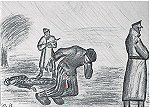
|
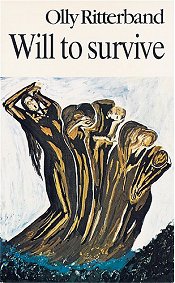
|
Winter 1945
We become fewer and fewer
18 January 1945
The Russians were approaching Auschwitz, and preparations were being made for the last major transport. At that time there were about fifty-eight thousand prisoners left. Five or six thousand were left behind. They were too ill to undertake the death march that lay ahead.
We were issued with food -lots of tinned food and huge rye loaves -but soon we couldn't carry the big load. Our arms were too weak, so we threw the food away.
Time to depart. Marching orders.
The journey took four days and four nights. At intervals we were pushed into an open cattle wagon, where we stood with the snow up to our knees.
Many went mad. At night the march halted. Then we just walked up and down on the road. Many froze to death.
I saw light from a window and knocked gently on the front door of the house. When nobody replied, I opened the door and crept in. There were many Germans there, and when they saw me, they shouted harsh words, telling me to get out. The room was warm, and there was a timber floor beneath my feet. I was rooted to the spot, I couldn't move. I stared at the screaming people. When they saw that I didn't react, they put the dogs on me. The dogs tugged at my clothes, tearing them to shreds. The door was wrenched open and I was chased out of the room by the dogs. I spent the whole night shuddering on the veranda.
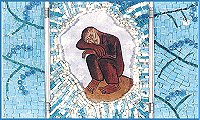
Tired of life.
Early in the morning there was a signal to resume the march, but I couldn't -and didn't want to either. I wanted to die. I felt so convinced that I would never manage to survive the ordeal, that the struggle was in vain.
A soldier stood pointing his gun at me, and said:
"If you don't get up, I'll shoot you."
Then my mother and Alice began to cry, yelling at me:
"Get up! Get up!"
Then they both grabbed me and dragged me along the icy road. They dragged me for a long time before I got onto my feet.
January 1945- Bergen-Belsen
"Heraus - Heraus!" the German shouted.
It is a dark winter's night, and we have to go out in the cold again. We gather together the few possessions we have. We are wearing our clothes, so we are ready to run. To run from the blows, run to get some food, run so as not to be seen.
There are twelve of us young girls and my mother. We cling together, giving each other strength to survive the day and the night.
It's been like that now for many days -far too many days. After the long trudge from Auschwitz we arrived at
Bergen-Belsen totally exhausted. We were worn out, right into the marrow. We were on the point of a total breakdown.
But fate had other things in store for us.
In the camp which we were chased into there was chaos.
A seething mass of confused humanity, with everybody fighting for a place on the floor in the barracks. But simply impossible to find a vacant spot.
The three of us were always together. We never left one another. We were afraid of losing one another. I always kept an eye on the other two. "Where's Alice? Where's Mother?" We always said it to one another, if one of the three had to leave -even just a few steps away.
The cold of the winter's night had settled over the camp, and we walked about wearing very few clothes. Our shoes were thin and shoddy. Standing outside under these conditions- how long could we endure it? If one were lucky, one might find a barrack wall to provide a bit of shelter from the piercing January sleet.
We managed to get hold of a few potatoes, and we also got a pot.
In the shelter of the night we furtively approached the house occupied by the Germans during the day. We got in without being observed. We were scared, but we succeeded in lighting a stove and heating water to boil the potatoes. The hot pot was passed from mouth to mouth.
At least we got some hot water into our stomachs.
But the pot did not reach every hungering mouth. One of the Germans had detected our presence. He roared at us:
"Heraus -Heraus!"
We were forced out into the cold of the night - and we froze. The sky was quite clear. The stars shone with great conviction.
A star fell. I followed its descent with my eye. I wondered if it were true - what I had been told as a child? That somebody had just died? Helen and I spent along time looking at the stars.
When would our stars fall? We were both so very young.
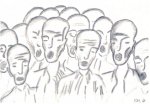
Who hear their voices?
They clung to one another,
but nobody heede their cry for help
Dawn broke.
The hopelessness of it all seemed less threatening during the day. It was the darkness -that was my worst enemy.
I saw my mother standing in a queue over at a barrack, where bread was being doled out. We didn't belong to that barrack. We didn't belong anywhere.
How nice it would be to have a crumb of bread between one's teeth. Over in that long queue they were counting over and over again. It turned out, of course, that there were far more than the number occupying that particular barrack. The woman supervisor asked the people in the queue if any of them didn't belong to that barrack. Everyone turned this way and that, so as to avoid being pointed out as an intruder. This was a matter of fighting for a slice of bread.
Then I caught sight of Szeren Farkas - the daughter of the synagogue caretaker in our town.
She was pointing at my mother.
The supervisor marched up towards my mother with long, rapid strides and began to hit her. My mother staggered and abandoned the queue. Alice and I ministered to our mother's wounds, but we couldn't console her.
The truth of the matter is that it was Szeren Farkas who had pointed her out. And just to think of what my father had done for that family. He had fought for ages to persuade the community to grant her father a decent salary.
We had been friends. She used to come to our house every day. She had such a beautiful voice, and often sang. She loved singing.
At a very early age she learned how to sew underwear. She gave the money she earned to her mother, so that she could feed the big family. She was a good girl.
At school we had performed together on big occasions singing and dancing.
But Szeren had pointed her finger at my mother.
I couldn't get it out of my mind - I kept on looking for an explanation. Then I remembered that it said in the Talmud that one should not ask when one could not get an answer.
If we were to have a chance of surviving, we had to do something about it. Helen and I spent hours and hours trying to find a way out of it all. When dawn broke the next morning, we felt that we might have found a solution. In any case we would have to take the chance.
We went to the camp kitchen, walked up the five steps and opened the door. We asked one of the girls to call the German SS kitchen chef. She did so - and that was nice of her. We waited at the foot of the steps. A moment later he stood there. Big and powerful looking in his riding britches, his hands held stiffly to his sides. His gaze was stern and questioning. I felt my throat muscles contracting, I shivered all over and the blood rushed to my head. I must have looked healthy. Helen must have felt the same.
We took it in turn to tell him that we came from Auschwitz, where we had worked in the kitchen. Maja, the chef at Auschwitz, had asked us to bring him her greetings and to tell him that she had appreciated our work, so that she would like to recommend us to the chef at Bergen-Belsen.
We had done it. The words had been uttered.
The SS man stood there for a long time, looking at us. We might as well have been two insignificant midges. The world stood still. The whole world stood still and waited for his reply. In our little world it meant everything. Then he said:
"I know that you are lying. But it was bravely done, so you deserve to live. Come on in."
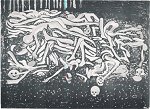
These were once all alive
It happened one evening in Bergen-Belsen.
Here there was no crematorium, but the number of deaths was high.
Many had fought their last struggle.
I was on my way over to the next barrack. The tidying-up squad -all prisoners -were supposed to pick up the corpses and place them on a wooden wagon and drive them away, but they didn't succeed in collecting them all, so day by day the appalling piles grew bigger and bigger.
In the dark I noticed nothing until I stumbled over a pile of corpses. They were naked. I had hardly the strength -physically or mentally -to get to my feet again.
I tried, but slid back. It was like tasting death itself.
I went back to my own barrack in a state of shock.

Bergen-Belsen: April 1945
The war was nearly over, but I didn't know that.
I was lying alongside Zsoka in a narrow bed. We had typhoid fever and were very ill. And at the same time we had fleas. We made time pass by catching each other's fleas, discussing in loud voices who had the most.
In recent times bombs had fallen close to the camp every day. But now the bomb alarms had stopped. Everything had become so quiet.
The British soldiers had arrived in the camp.
"Get up and come out to the trucks!" somebody shouted.
But I couldn't walk. I just lay there in my own filth, with a raging temperature. The British soldiers helped me out and into the truck.
Then I realised that the war was over. It was spring. The sun was shining. The air felt clean. It all came so suddenly. The joy was probably too great. I became so uneasy that those around me had difficulty pacifying me. I shouted -I sang. I almost levitated. I believed that I could fly - and I wanted to fly. I remember it so clearly. They had to use force to restrain me.
They drove us to some houses in another part of the camp. The SS officers had lived here. Real houses. Mother, Alice and I got real beds.
Slowly I began to get well, and one day I went up to the man in charge of the British mess and began to help.
A British woman officer called me to her and explained that I was to wait on her. She was called Miss Montgomery. I saw only her. I stood like a shadow behind her chair and served her at mealtimes.
One day she asked me if there was anything she could, for me. There was.
In Bergen-Belsen there was a Yugoslav rabbi, who had list of those who survived Buchenwald, and on that list found my brother's name: Bela Czitron. I cut out small slips of paper-notes - and on them I wrote: "To Bela Czitron - Buchenwald. Come to Bergen-Belsen. We are here. Olly."
Day after day, hour after hour, I stood and waited for the military trucks that were leaving Bergen-Belsen. I asked the drivers to throw out the notes in the vicinity of Buchenwald.
I told Miss Montgomery about my brother. She immediately sent a military truck to Buchenwald, where they tried to contact my brother over the camp's loudspeaker.
But my brother had already found one of my notes and was on his way to Bergen-Belsen. He found us among thousands and thousands of people. It was a miracle.
Then it was decided that Mother and I should go to Sweden on one of the "Bernadotte buses", as they were called after the Swedish Count Folke Bernadotte, who organised the rescue mission.
We reached Lübeck, where we were billeted in a gigantic hall. Mattresses were put on the floor. Tents were erected outside. Every single one of us was ushered into these tents and undressed, shaved, disinfected and washed and scrubbed with thick-lathered soap. Maybe it all sounds embarrassing, but it was probably necessary. Our clothes were put into an oven, to get rid of the lice and fleas. It took a long time.
There I stood, nice and clean - but freezing. I couldn't find my clothes. At last I found a pair of overalls -far too small for me.
That pair of overalls was all I had when I arrived in Sweden.
 TO PART IV: SWEDEN
TO PART IV: SWEDEN
|

